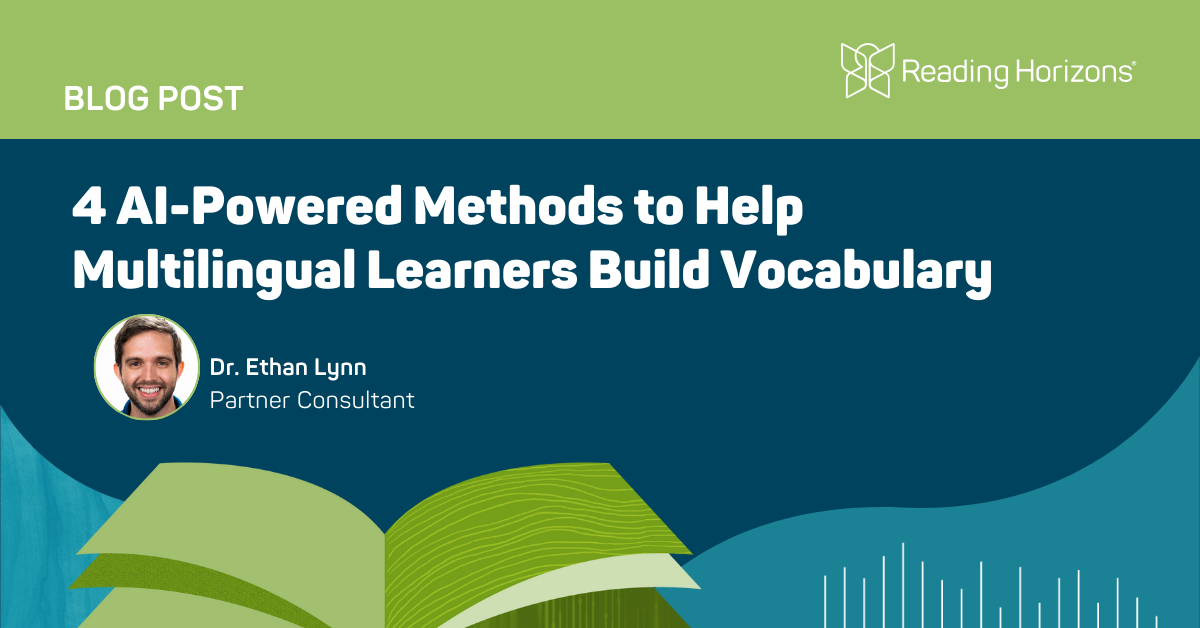Vocabulary is crucial to learning any language, and studies have shown a strong link between vocabulary knowledge and reading achievement. While explicit vocabulary instruction is essential for all students, multilingual learners (MLLs) require a deeper focus on the linguistic aspects of language to lock in reading proficiency.
As multilingual learners (MLLs) continue to be the fastest-growing student subpopulation in public schools, educators must find innovative ways to help these students succeed. In some states like Florida, Texas, and California, more than 250+ languages are spoken in classrooms, so the challenge is linguistic and cultural. Despite this classroom language diversity, fewer than 3% of teachers have specialized certifications to effectively support MLLs.
Enter AI-powered solutions—tools that can bridge the gap and enhance vocabulary-building strategies.
Here are four powerful AI-driven methods to help multilingual learners expand their vocabulary.
1. The Bilingualized Approach
The bilingualized approach integrates both definitions and translations to deepen comprehension. Unlike monolingual or bilingual dictionaries, bilingualized dictionaries provide a learner-friendly definition alongside a direct translation in the student’s first language (L1).
Example:
For the word cat:
- Definition: “A small animal that is related to lions and tigers, often kept as a pet.”
- Translation: gato (Spanish).
This method, powered by AI tools, allows learners to connect concepts in English with their native language, ensuring better retention and understanding.
2. Morphological Word Families
Understanding word families helps learners see how headwords, prefixes, and suffixes combine to create meaning. The AI tools we’ve created can generate comprehensive word families for any headword, allowing students to explore connections between related words.
Example Output for the word teach:
- Teaching (-ing)
- Taught (irregular past form)
- Teacher (-er)
- Teachable (-able)
- Reteach (re-)
These word families equip students with the tools to decode new vocabulary and expand their lexicon organically.
3. Collocations
Collocations—words that naturally occur together—are essential to activate the context processor and ensure words are entrenched in long-term memory. AI tools can help students understand how words combine in real-life contexts.
Example Output for the word momentum:
- Adjective + Word: considerable momentum, great momentum
- Verb + Word: build up momentum, increase momentum
Now, let’s see what this would look like in a sentence:
- The movement gained considerable momentum.
- The momentum increased rapidly during the final stages.
By mastering collocations, multilingual learners gain confidence in using vocabulary in practical and meaningful ways.
4. Cognates
Cognates are words that share the same origin and meaning across languages, offering a quick bridge for vocabulary acquisition. However, false cognates—words that look similar but have different meanings—can cause confusion. AI tools can distinguish real cognates from false ones and provide clarification.
Example:
- Real Cognates:
- Fruit (English) ↔ Fruta (Spanish)
- Animal (English) ↔ Animal (Spanish)
- False Cognate:
- Embarazada (Spanish) ≠ Embarrassed (English). Explanation: Embarazada means pregnant, not embarrassed.
Learning cognates provides a rapid and natural method for enhancing vocabulary acquisition by leveraging linguistic transfer.
Conclusion
The integration of AI-powered tools in education has the potential to revolutionize how multilingual learners acquire vocabulary. These four methods—bilingualized dictionaries, morphological word families, collocations, and cognates—are just the beginning of how technology can expand opportunities for all students.
Unlock the AI-Powered MLL Toolkit
Get instant access to the AI-powered tools featured in this post, along with the webinar recording to help you implement them effectively.
Explore the latest innovations in teaching multilingual learners to stay ahead of the curve in education. Empower your students to achieve their full potential today!

